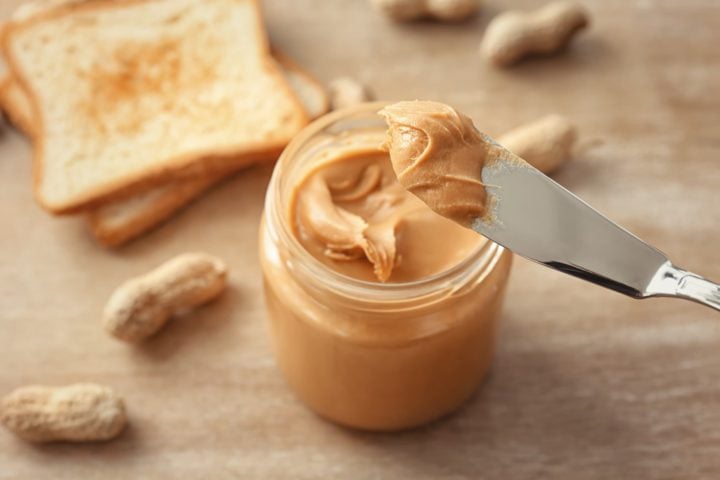
Peanut butter is one of the most popular spreads on the planet. The way it adheres to the roof of your mouth before melting is quite appealing to the taste buds. When slathering peanut butter on crackers or bread, it's easy to get carried away.
It’s true! You could do a lot worse than peanut butter when it comes to creamy, buttery goodness. The hazelnut spread is surprisingly healthful, despite its velvety texture and high-calorie density. Peanut butter, which is high in healthy monounsaturated fats, plant-based protein, and minerals like magnesium, folate, and vitamin E, deserves a place in a healthy diet.
Even so, there is such a thing as too much of a good thing. It's easy to overdo it and consume too much peanut butter all at once.
But stop right there because one serving of peanut butter is only two teaspoons of this most famous spread.
Peanut butter is famous, too, among those who are diet-conscious. Rumor has it, however, that peanut butter is a culprit of one of the most uncomfortable symptoms — constipation.
Table of Contents
What Is Constipation?
Constipation may be a symptom of an illness or the result of your dietary preferences. When it is accompanied by another dysfunction in the organ systems, it is termed “organic.” This type is more challenging to treat.
On the other hand, constipation may be due to our daily food choices. A low-fiber, low-carbohydrate, high-fat diet contributes to constipation. There are many medications that help with constipation. But, it is easier to keep track of our food intake in a diary to attribute the symptoms to which food or drink was consumed.
A person may be constipated if they have any of the following symptoms: passing fewer than three stools a week, having lumpy or hard stools, or straining to have bowel movements. It can also present as a feeling of incomplete defecation. Often, there is a need for medications or manual extraction to help empty the rectum.
You are considered to have chronic constipation if these symptoms last longer than three months. A search for causes of chronic constipation includes frequent intake of fried foods, drug intake, irritable bowel syndrome, and other problems in the nerve supply of the rectum and anus.
The Goodness in Peanut Butter
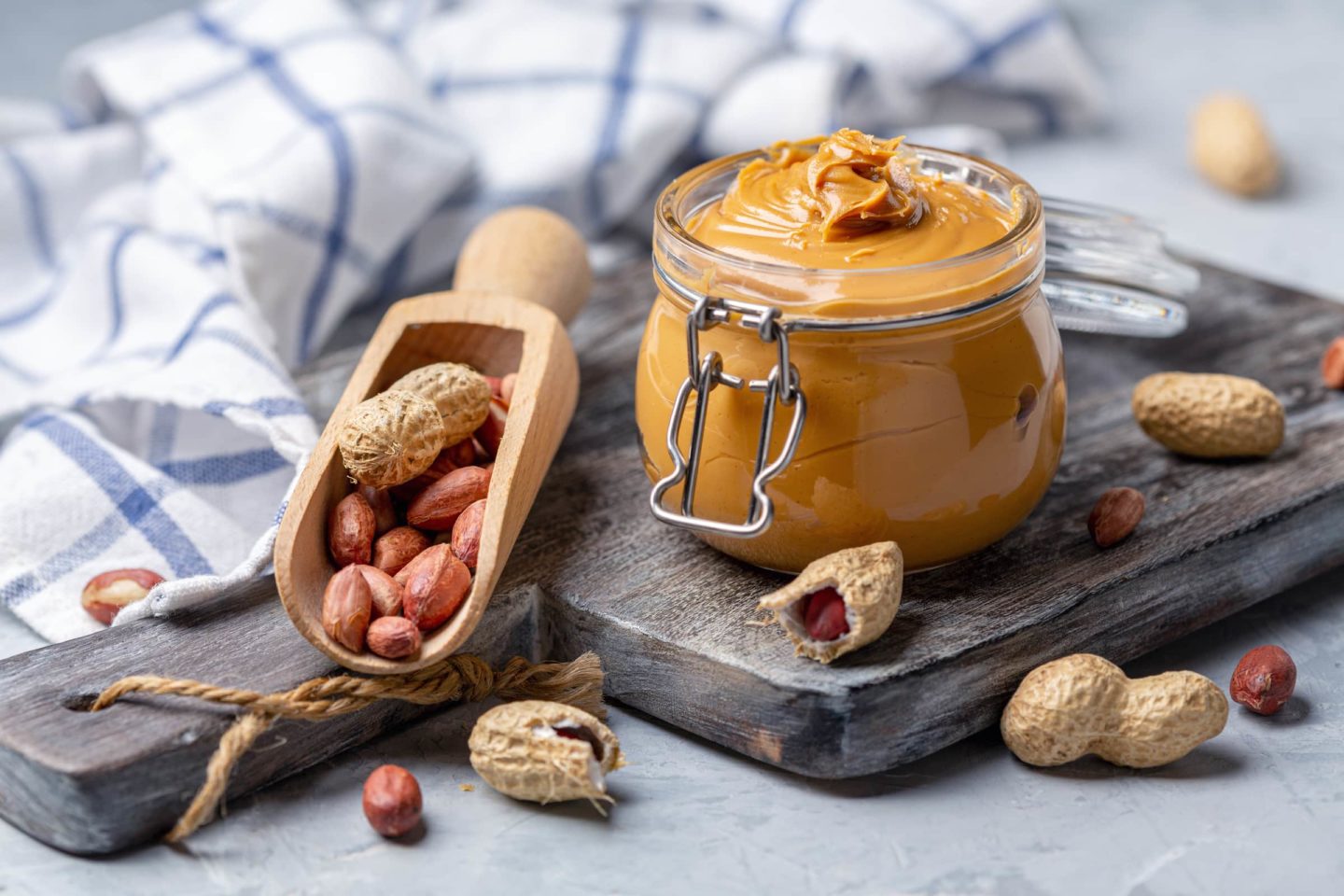
Peanut butter is a natural product that is relatively unprocessed. It's just roasted peanuts that have been mashed into a paste. However, this isn't always the case with commercial peanut butter brands. These may include additional substances such as sugar, plant oils, and trans-fatty acids.
The homemade recipe for peanut butter is packed with health benefits. Let’s take a look at the individual nutritional components of peanut butter.
Macronutrients
Peanut butter is a well-balanced energy source, including all three major macronutrients. A 3.5-ounce (100-gram) serving of peanut butter comprises the following:
- 22.5 grams of protein or 14 percent of calories, which is a lot in comparison to most other plant foods
- 22 grams of carbohydrates or 14 percent of calories, 5 grams of which are fiber
- 51 grams of fat, or 72 percent of total calories
Peanut butter is a rich source of protein. However, it has lower amounts of the essential amino acid methionine than animal sources. Methionine is an antioxidant that is not naturally produced by the body; thus, it must be ingested from food.
Peanut butter is excellent for a low-carb diet because it contains just 20% carbohydrates. This makes this spread suitable for persons with diabetes. According to research, peanut butter consumption was connected to a lower risk of acquiring type 2 diabetes in the long run.
Peanut butter is so high in fat that a 3.5-ounce portion has a whopping 597 calories. Most of the fat content consists of monounsaturated fatty acids or the “heart-healthy” ones. Therefore, consuming moderate amounts of pure peanut butter or whole peanuts is entirely appropriate, despite their high-calorie content. It is a fantastic alternative for vegetarians or those on a plant-based diet.
Oleic acid, a beneficial type of monounsaturated fat found in significant proportions in olive oil, makes up half of the fat in peanut butter. Oleic acid is an antioxidant that could also help lower the risk of diabetes.
Fiber Content
The fiber content in peanut butter aids in the prevention of constipation. According to the Institute of Medicine, each 2-tablespoon serving of peanut butter contains 2.6 grams of fiber, which is about 10% of the daily intake for women and about 7% for men.
Fiber is a natural cure for constipation since it is a fiber-rich food. It also makes you feel full longer, thereby curbing those mindless snacking in between meals.
Peanut butter has higher dietary fiber per serving than whole peanuts and is high in soluble and insoluble fiber.
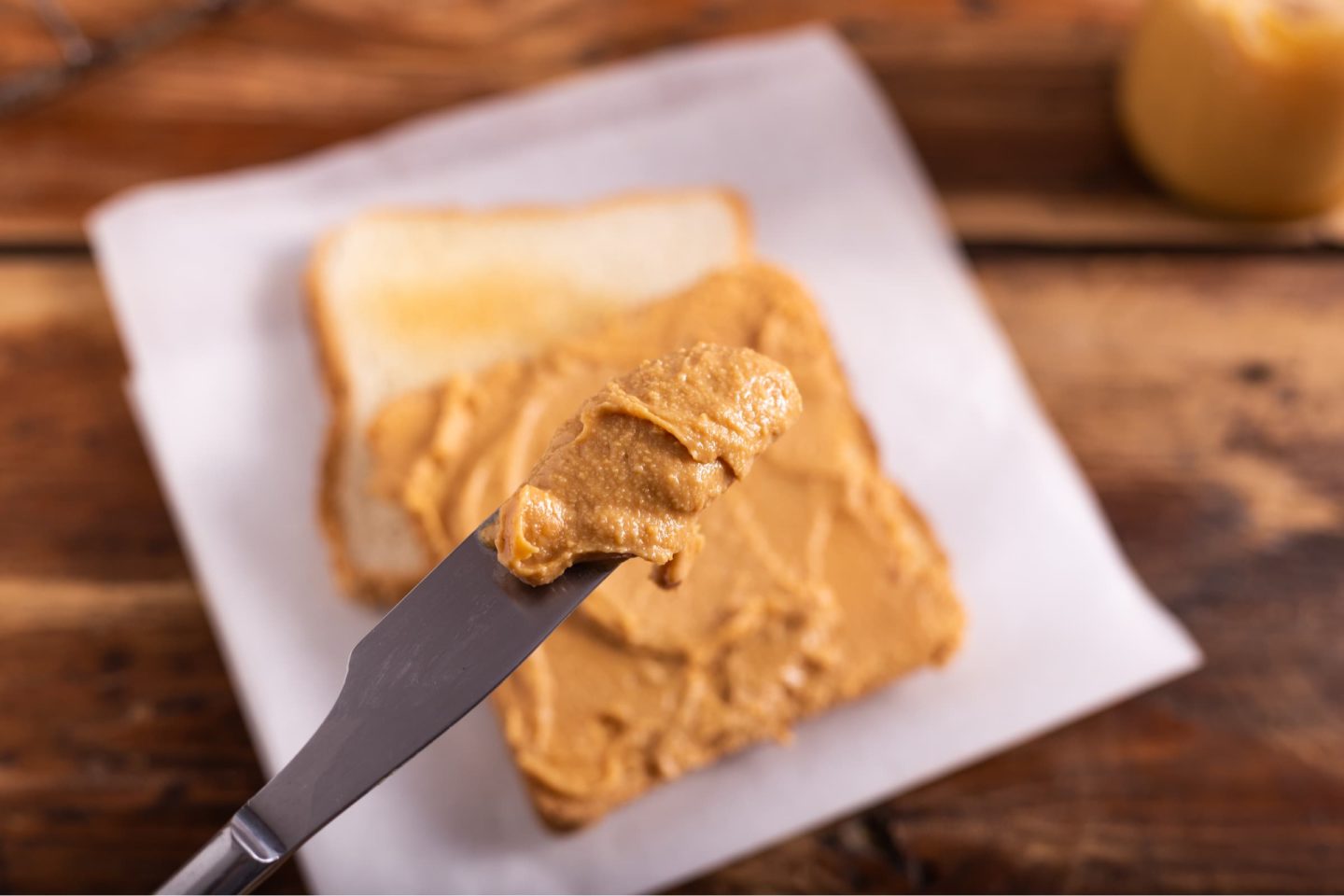
Soluble fiber
Mucilage, gum, and pectin substances found inside plant cells make up soluble fiber. Of peanut butter's total fiber content per tablespoon, 0.3 grams is soluble fiber. High soluble fiber consumption has been associated with a decreased risk of diabetes and high blood cholesterol.
Insoluble fiber
Unlike soluble fiber that attracts water, insoluble fiber adds weight or bulk to your stool. It may also help avoid digestive problems such as hemorrhoids, colon cancer, diverticular disease, constipation, and intestinal ulcers. Peanut butter contains 0.7 grams of insoluble fiber per tablespoon.
Do Peanuts Cause Constipation?
Peanuts are nutrient-dense foods. One-ounce serving of dry, roasted peanuts contains two grams of dietary fiber. Peanuts, themselves, don’t cause constipation, but they should be consumed in moderation.
Recommended Daily Intake
We should be aware of portion sizes to prevent surpassing our daily calorie requirements. Most of us should limit our intake to 1–2 tablespoons (16–32 grams) per day. One tablespoon or 16 grams is roughly the size of a thumb, whereas two tablespoons or 32 grams are approximately sized like a golf ball.
It is also a good idea to measure out your peanut butter so you don't consume too much. To keep you fuller for longer, sprinkle half a spoonful of peanut butter into your morning oatmeal or spread a tablespoon over crackers as a snack.
Compared to commercial peanut butter, homemade peanut butter protein balls are also an intelligent way to portion your consumption because you'll know exactly how much you're eating.
Another strategy to limit your peanut butter consumption is to eat it with fruit, such as an apple or banana. When you combine it with another dish, you get a wider range of flavors.
Rather than eating it straight from the jar, take your portion and combine it with that other healthy item that goes well with it.
Does Peanut Butter Cause Constipation?
Peanut butter's thick, intractable texture makes it easy to imagine it clogging your intestines and creating constipation — but in most cases, even heavy doses of these won't cause problems. In fact, with up to 6 grams of fiber per serving, peanut butter can help keep your GI tract moving.
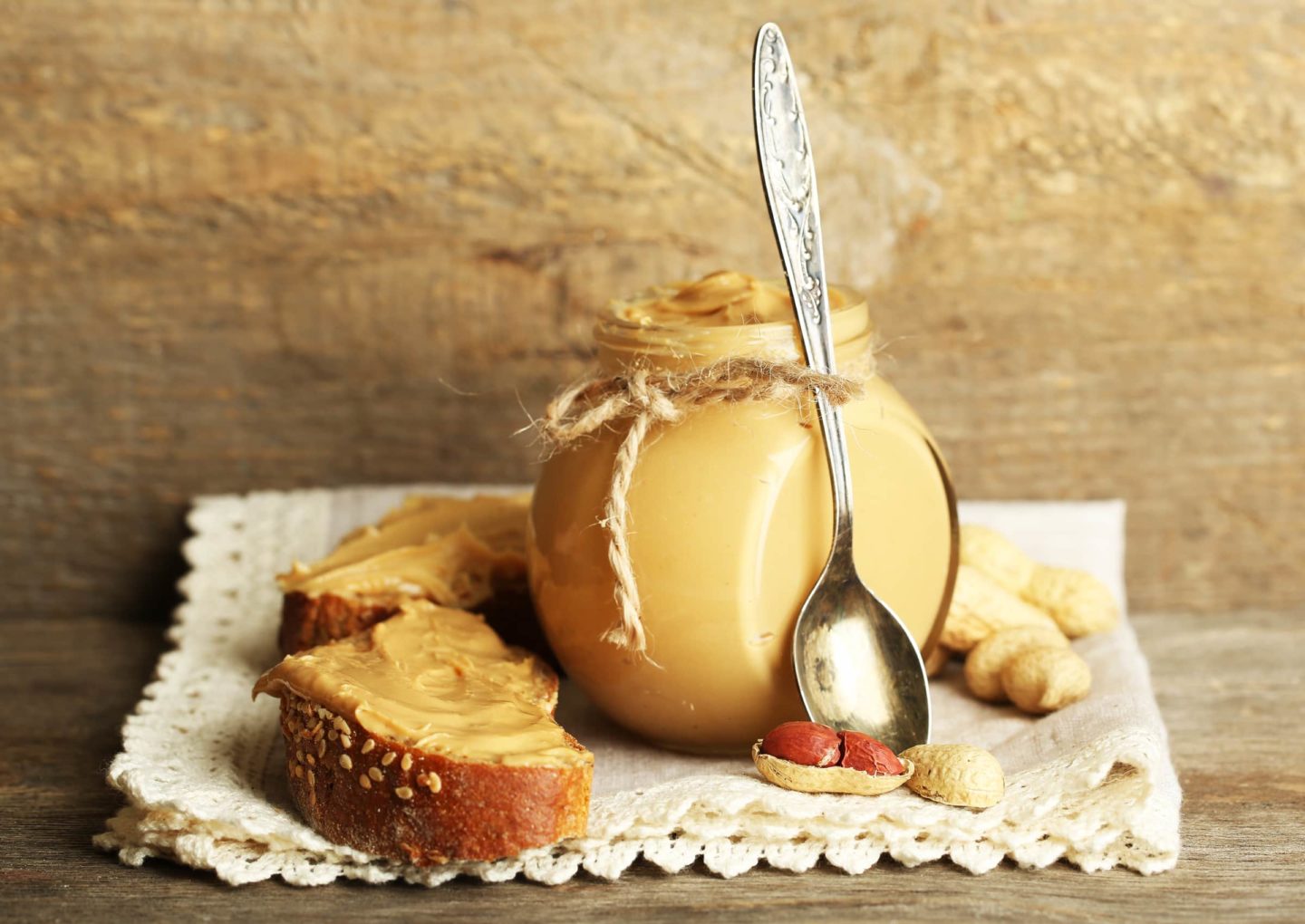
There is a limitation to the peanut butter digestion equation, however. Too much peanut butter without adequate hydration could be the cause of your gastrointestinal distress. To answer the question of peanut butter causing constipation: the bad news is that there is a slim chance that it will.
Peanut butter is safe to eat, but it influences bowel movement and can produce gas, diarrhea, or constipation. Here are some scientific explanations for this.
Insensitivity to Salicylates and Amines
These two components are found most abundantly on the skin of peanuts. Salicylates and amines, which are natural dietary compounds found in a range of foods that most people eat regularly, are moderately present in peanut butter.
Those hard stools could be the result of dietary intolerance. If you have gastrointestinal difficulties or are sensitive to salicylates or amines, eating peanut butter every day could build up these natural food compounds in your body, causing food sensitivity symptoms, including constipation.
Heavy in Saturated Fats
Two tablespoons of peanut butter contain around 5gm of saturated fat. When multiplied by the multitude of times you consume peanut butter in a day, this number could skyrocket.
High saturated fat intake is linked to an increased risk of constipation and fewer bowel movements.
Commercially available peanut butter has a lot of extra additives and chemicals, which raises the saturated fat and trans fat levels. This could worsen the scenario. Read the labels of the peanut butter you are using before eating it.
High Protein Content
A high protein diet is becoming increasingly popular in today's health-conscious society, where the keto diet is the fitness credo. Many people reduce their carb intake and increase their protein intake to lose weight quickly or transform their bodies dramatically.
As with those who use peanut butter as their protein source, constipation may be a problem. While consuming too many carbs isn't recommended, if you're attempting to lose weight, drastically reducing your carb consumption too rapidly can stress your GI system.
Lack of Hydration
If you don't drink enough water while eating a high-fiber diet, it can still cause constipation. After eating peanut butter-based foods, make sure to drink lots of water.
Also, when you overeat protein, like in peanut butter, your kidneys must work harder to digest it. This means that your body will require more fluid to keep your digestive system running smoothly. Even if you don't feel thirsty, your body still needs additional hydration.
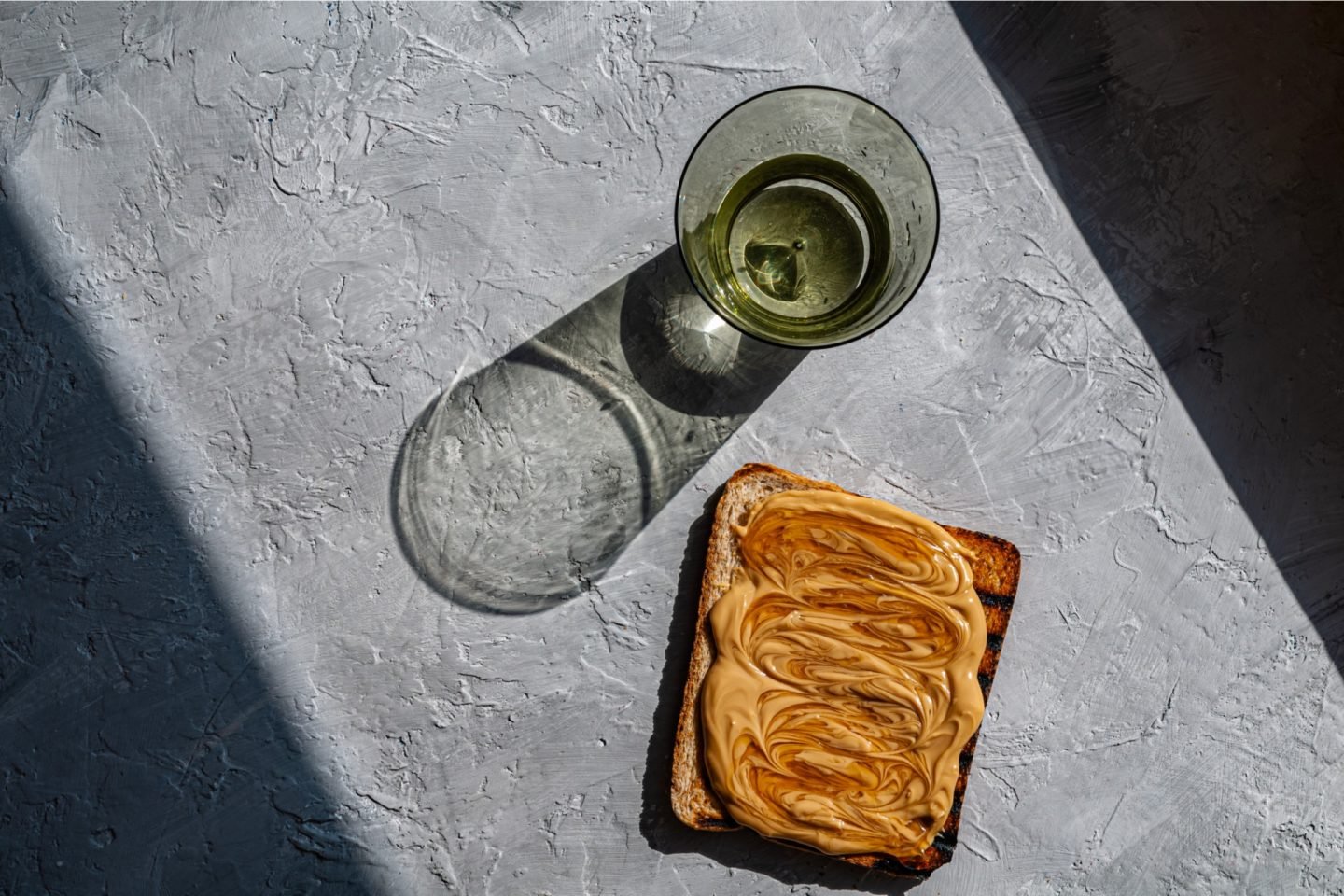
Too Much Vitamin B3 or Niacin
Peanut butter is a good source of niacin, often known as vitamin B3. Peanut butter contains 4.5mg of niacin in two tablespoons (32gm), around 25% of the daily recommended dose for males and 30% for women.
Although niacin is beneficial to your body and is essential for the healthy functioning of your bodily organs, over-ingestion of this vitamin has been linked to digestive issues such as constipation, bloating, and hard stools.
Peanut butter is essential for persons who are deficient in niacin. The necessary niacin intake varies depending on age and gender. Still, if you already get enough niacin from your diet plus consume lots of peanut butter, it could be the cause of your constipation problems.
Peanut Allergy or Intolerance
An allergic reaction to peanuts differs from intolerance. An allergic response triggers the body to release inflammatory cells, which can cause swelling of the digestive system. This may initially present as abdominal pain, bloating, and diarrhea. Because it triggers the immune system, a person may feel itchiness, a runny nose, difficulty breathing, or rashes.
In younger children, peanut allergy might not present with loose stools. Constipation is more common in children under three years old as a symptom of food allergies before it fades with age.
Peanut intolerance, on the other hand, activates only the digestive tract. Peanuts are high in protein and may not be easily tolerated by some people. The most common symptoms of peanut butter intolerance are indigestion, bloating, and constipation.
Summary
Peanut butter is a nutritious addition to your everyday diet. It's a fantastic vegan butter because it's high in fiber, protein, carbohydrates, and other nutrients.
It’s challenging to consume peanut butter in moderation because it simply is delicious and a perfect match to almost anything. But it is always important to keep an eye on your food intake.
Although peanuts and peanut butter have no known adverse effects, they do contain a lot of saturated fat, protein, niacin, and salicylate, which, in large amounts, can induce peanut butter constipation in some people.

Leave a Reply